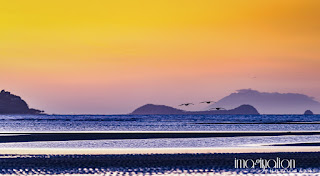At the very same time that I was staring at sand for the tiniest insects that the human eye can see, there was another person on the sand flats photographing the scenery with the best camera I have probably ever seen. The camera was a 36 mega-pixel Nikon D800 full frame DSLR using prime (fixed length) lens. Prepare to see the Barron River sand flats as you have never seen them before. Click to view.
The photos show what we would see if we could look into the sun. I talked to Tony as he waited for the clouds to fire up. There are a few minutes each day when the clouds are lit from below with the red sunlight of the setting sun. Trying to be of value, rather an annoying person, I mentioned that the pelicans come in fast and low at about this time of day as they head to their night time retreat. Tony took up the challenge. It was about half an hour after the sun had set before the first pelicans showed up in silhouette against a sky orange with volcanic dust.
As the pelicans have to fly into the trade winds, they tend approach the river in the wind shadow of tall trees then suddenly drop down to a metre above the ground to fly under the wind. Their flight path is almost predictable so we could let them come to us. A disappointingly low number of pelicans had gone past and the sky was now so dark that even black and white pelicans were hard to seen. But at that moment Tony spotted some pelicans flying further out and keen to show what a top end professional camera can to took some photos of the distant flock passing in the blue-black of early night. The results are below and show something quite amazing, the flock of pelicans was being lead by a Black Swan!
There are a lot more photos of our tropical coast on Tony's web site.
 |
| Photo I took of Tony when he was photographing the sunset. |





No comments:
Post a Comment